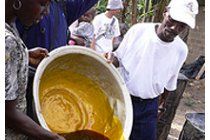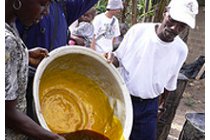World Bank funding of palm oil rousing controversy
The World Bank’s proposed easing off on its palm oil strategy has roused relief for corporations worldwide whilst attracting mixed reactions to its plan to finance only firms pursuing green standards.

 The World Bank's proposed easing off on its palm oil strategy has roused relief for corporations worldwide whilst attracting mixed reactions to its plan to finance only firms pursuing green standards.
The World Bank's proposed easing off on its palm oil strategy has roused relief for corporations worldwide whilst attracting mixed reactions to its plan to finance only firms pursuing green standards.
The revised palm oil strategy of the World Bank is nearing the end of the development stage. It purports financing primary producers of palm oil, prioritising investment to those firms that depend on small farmers for supply and that support sustainable requirements.
The suspension of International Finance Corporation (IFC) funding to the palm oil industry has continued since 2009 due to social and environmental concerns.
Companies worldwide subsequently boycotted the palm oil market. US fast food giant Burger King stopped buying palm oil from Sinar Mas and its subsidiaries after Greenpeace mounted a successful campaign against its land-clearing practices.
Fadhil Hasan, executive director of the Indonesian Palm Oil Producers Association (Gapki), voiced disagreement with the favoured new funding strategy. He said that the jobs created by palm oil producers should be taken into account.
A consortium of indigenous peoples, palm oil smallholders, and non governmental organisations is demanding the World Bank maintains its current freeze on funding the sector until it has a credible strategy to address the sector's manifold problems.
Environmental groups Greenpeace and Sawit Watch support this stance, believing that regulations for meeting environmental criteria should first be met.
Another major issue is that even if the IFC continues withholding funding, palm oil companies are still able to seek private investment for their damaging deforestation operations. Such private companies are considered to be out for profit, with little regard for biological diversity and the effects of climate change.
According to new figures from the Roundtable on Sustainable Palm Oil (RSPO), global production of sustainable palm oil has doubled so far this year. This suggests that buyers with concerns on biodiversity can exploit the supply of palm oil to a higher extent than ever before.
The World Bank's proposed plan to resume funding is good news for a diverse range of industries that use palm oil, from the manufacture of cosmetics and food products, to use in biodiesel.
Since 1965, the World Bank has channelled nearly $2 billion for 45 projects in the palm oil sector in 12 nations across Africa, Latin America and Southeast Asia, according to the company's own figures.
Figures suggest that Indonesia has been a major focus of the financing, receiving $618.8 million of the total investment until funding was ceased in 2009.
Indonesia is the world's largest producer of palm oil despite escalating environmental campaigns, while Malaysia remains the biggest exporter. Indonesia is also the third largest user of palm oil after China and India. The United States Department of Agriculture (USDA) currently estimates Indonesian palm oil production in 2010/11 at a record 23.0 million tons, up 2.0 million or 10 per cent from last year. Edible oil supply is dependent on this, with palm oil as the cheapest vegetable oil on the market.
The number of foreign-listed plantation groups in Indonesia has grown rapidly since the early 1990s, with over half of the planted area now owned by private companies. Many have been seeking listing on the Stock Exchange of Singapore (SGX) and the Jakarta Stock Exchange (JSX).
Indonesia is gradually being recognised as the future CPO price benchmark setter instead of Malaysia. This may contribute to increased desire to invest in the market.
With regard to the damage to jobs markets in the developing world, some green groups believe the new investment would create only short term jobs because when global warming continues unchecked, the warmer temperatures will be unfavourable for growing palm oil.
The IFC has taken into account input from almost 3000 stakeholders in its creation of a new framework within the $30 billion palm oil industry.
In the first months of 2011, the framework will be disclosed for 30 days before it is finalised and presented to World Bank President Robert Zoellick for approval.
The World Bank claims to now be in the concluding stages of a multifaceted consultation.
Robert Zoellick was responsible for freezing World Bank Group funding worldwide in the palm oil sector, pending the social and environmental concerns. It is now his responsibility to ensure safeguards are in place to protect all stakeholders.
If the World Bank makes the decision to resume funding, businesses are urged to continue their own assessment on sources of palm oil supply, with regard for land and sustainability of crops. Demand for palm oil has increased across various markets and it is up to all those in the supply chain to ensure healthy growth of the industry. Author: Marianna Keen | Climate Action Image: oneVilliage Initiative/ Flickr






